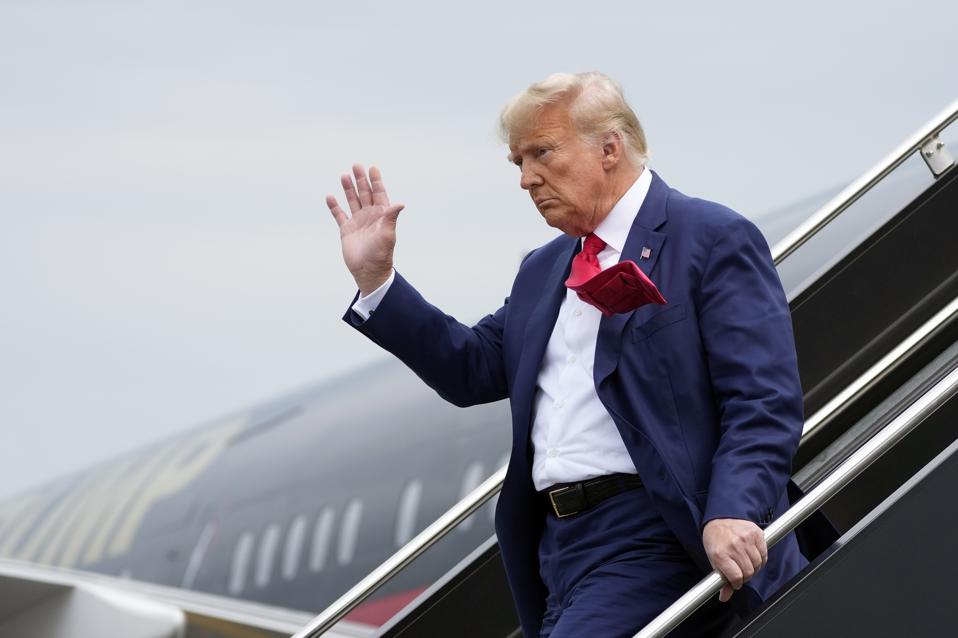Topline
Former President Donald Trump surrendered to federal authorities in Washington, D.C., Thursday afternoon ahead of his arraignment on four federal felony charges accusing him of defrauding the U.S. by attempting a wide-raging scheme to overturn the 2020 election in a bid to stay in power—marking the third criminal case against him since he announced his latest run for the White House.
Key Facts
Trump was formally arrested and entered the courtroom, flanked by lawyers Todd Smith and John Lauro, minutes before his 4 p.m arraignment at the E. Barrett Prettyman Courthouse in D.C.
Special Counsel Jack Smith was also spotted in the courtroom.
Three officers who were on duty during the January 6 Capitol riots—D.C. Metropolitan Police Officer Daniel Hodges, former Capitol Police Officer Aquilino Gonnell and Capitol Police Officer Harry Dunn—were also in at the hearing, multiple outlets reported.
Trump declared on Truth Social Thursday afternoon he would be “arrested for having challenged a corrupt, rigged, & stolen election,” calling it a “great honor.”
Trump was charged Tuesday by the Justice Department with conspiracy to defraud the U.S., obstruction of an official proceeding, conspiracy to obstruct an official proceeding and conspiracy against rights, which carry maximum prison sentences ranging from five to 20 years.
Trump is expected to enter a plea of not guilty before Magistrate Judge Moxila Upadhyaya.
Like his first two arraignments in federal court in Miami in June and Manhattan Criminal Court in April, Trump is not expected to be handcuffed, have his mugshot taken or be remanded to custody, given his high profile and low flight risk.
Key Background
The Justice Department accused Trump in a 45-page indictment unsealed Tuesday of taking numerous steps to subvert the results of the 2020 presidential election by “knowingly” making false accusations of widespread fraud. The indictment alleges he and six co-conspirators pressured state and federal officials to aid his efforts over a two-month period after November 2020 and devised a scheme to enlist fraudulent electors to cast their votes for Trump versus President Joe Biden. The indictment also lays out in detail how Trump riled his supporters to D.C. on January 6, when Congress was certifying the Electoral College results, and refused to tell them to retreat for hours after they broke into the Capitol, though prosecutors did not charge him with any insurrection-related offenses.
Contra
Trump’s lawyer John Lauro has claimed his actions surrounding the 2020 presidential election amounted to free speech protected by the First Amendment and that he was simply following the advice of his lawyers when he took steps to contest the results. Legal experts say prosecutors must prove that Trump knew his claims were false. Trump and his allies have claimed the case, and the other two filed against him, are politically motivated efforts by Biden-aligned prosecutors designed to hurt his chances of being re-elected—though he has gained traction in polls since his first indictment. Trump and his allies have also claimed—without evidence—the indictments were purposely timed to cover up allegations of unlawful foreign business dealings against Biden’s son, Hunter Biden, whose plea deal on tax and gun charges unraveled in court last week. Republicans have also made broad allegations that the president improperly used his influence to benefit his son’s business dealings, but have not produced any solid evidence to back up their claims, and Biden has repeatedly said he had no involvement in Hunter Biden’s business matters.
What We Don’t Know
When the case could go to trial. Special Counsel Jack Smith said Tuesday he wanted a “speedy trial” in the case. Under the Speedy Trial Act, federal cases are required to go to trial within 70 days of an indictment, though Trump’s legal team has indicated it will seek to delay the timeline. Lauro and Trump have suggested they will also request a venue change in the case to the Republican-leaning state of West Virginia, though the move is unlikely to be unsuccessful as D.C. judges overseeing other January 6 cases have refused to meet similar demands made by defendants.
Big Number
78. That’s the number of felony charges filed against Trump since he announced his third run for president in November. The Manhattan District Attorney’s office indicted him in March on 34 felony counts of falsifying business records in connection with an alleged 2016 hush-money scheme, marking the first-ever criminal indictment of a former president. The Justice Department indicted him in June on 37 counts related to his handling of classified records after leaving office, including 31 counts of violating an Espionage Act provision that prohibits willful retention of national defense information. Prosecutors filed three additional felonies against Trump in that case last week, including one additional Espionage Act violation in a superseding indictment that accuses him of taking steps to conceal his efforts to hide documents from Justice Department investigators. Prosecutors indicted two others, aide Walt Nauta and Mar-A-Lago employee Carlos De Oliveira, in the classified documents case, accusing them of helping Trump hide the records. Trump has pleaded not guilty in both cases.
Tangent
Upadhyaya is filling in for D.C. District Judge Tanya Chutkan, who was randomly assigned to the case and is known for doling out some of the harshest sentences to January 6 defendants of any federal judge who has overseen the cases of the 1,000-plus people charged in connection with the riots. Chutkan previously ruled against Trump as he sought to block the January 6 House select committee from accessing his presidential records, triggering the release of a trove of White House communications it used in its 18-month investigation of Trump’s conduct—information that was heavily cited in the Justice Department indictment.
Further Reading
Trump Indicted: Here’s How DOJ Says He Illegally Tried To Overturn The 2020 Election (Forbes)

